Unit 1 What did you do during the holidays? 课件(共29张PPT 内嵌音频)
文档属性
| 名称 | Unit 1 What did you do during the holidays? 课件(共29张PPT 内嵌音频) |

|
|
| 格式 | pptx | ||
| 文件大小 | 9.3MB | ||
| 资源类型 | 试卷 | ||
| 版本资源 | 湘少版 | ||
| 科目 | 英语 | ||
| 更新时间 | 2021-08-15 00:00:00 | ||
图片预览

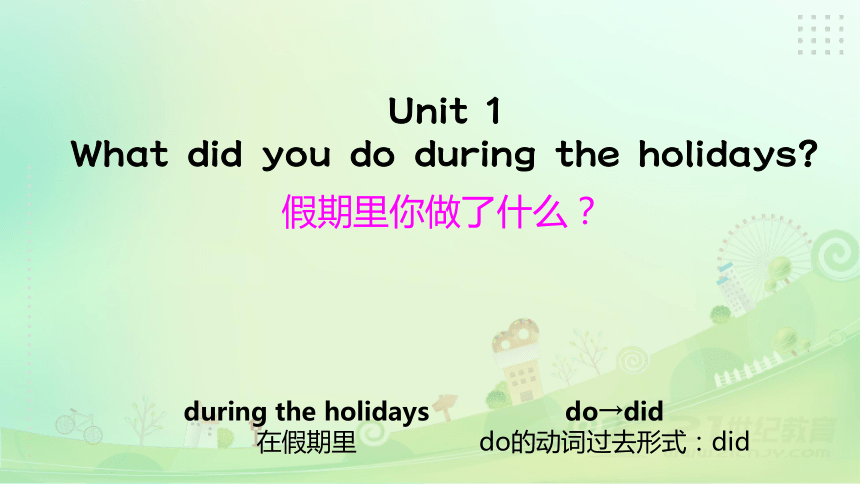
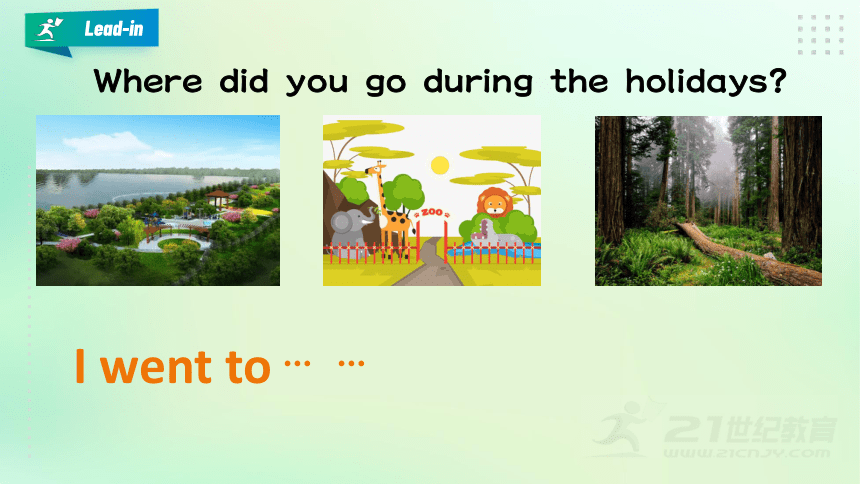
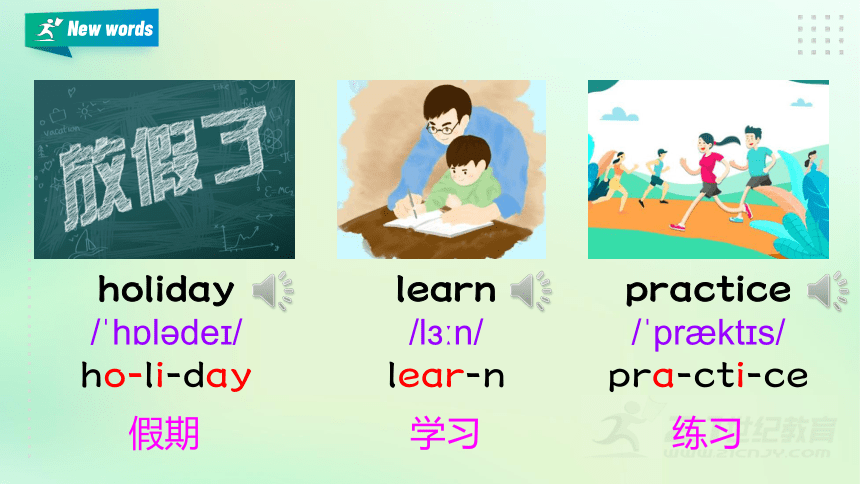
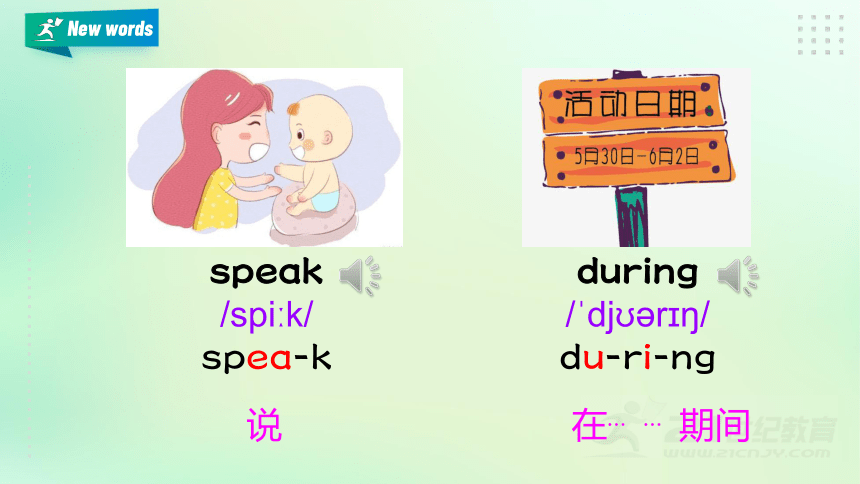

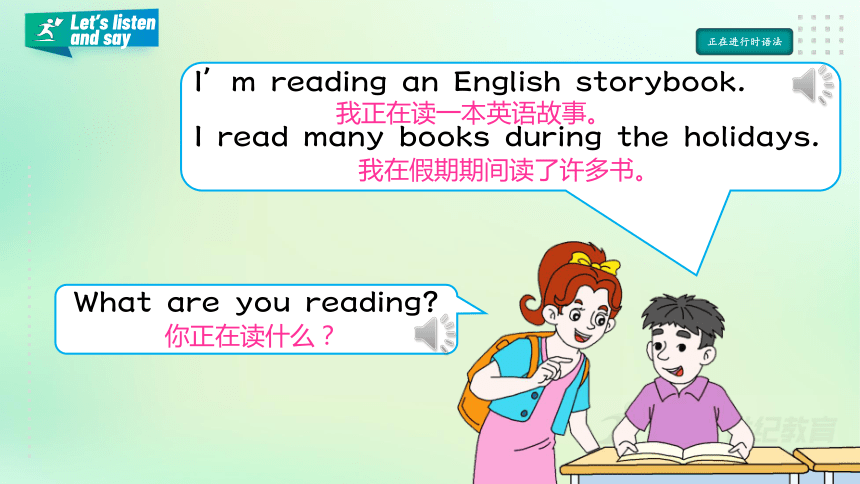
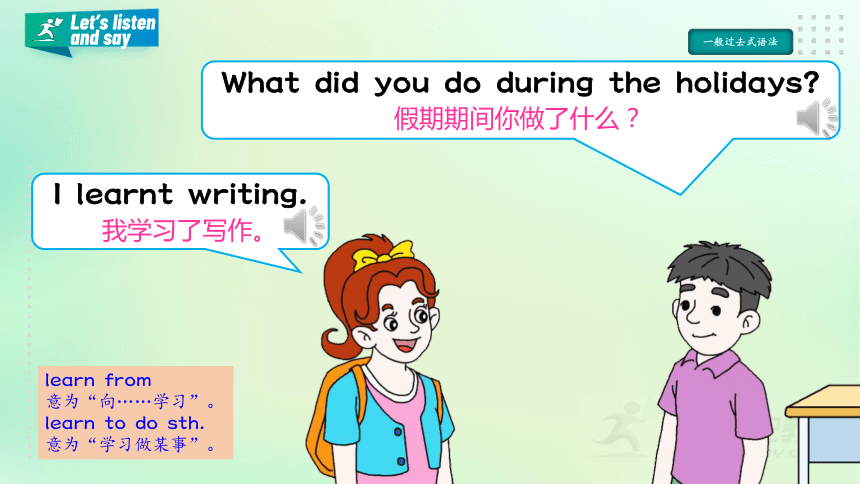
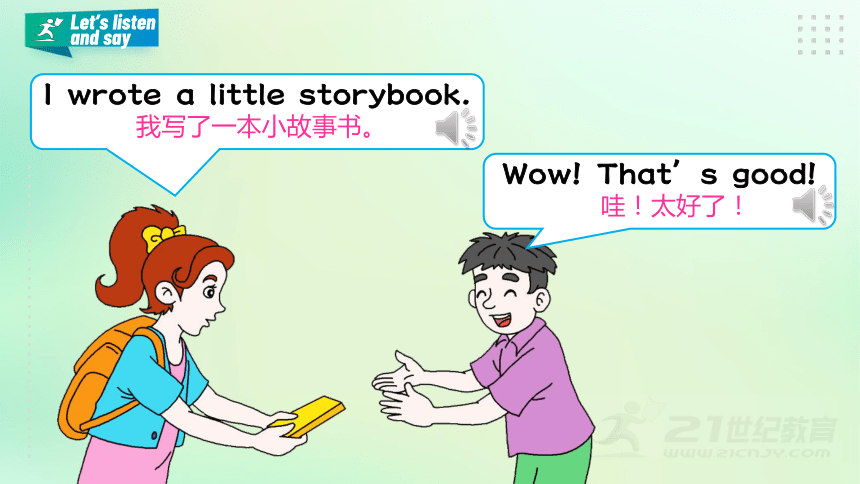
文档简介
(共26张PPT)
英语
第一单元
湘少版
六年级上
Unit
1
What
did
you
do
during
the
holidays?
假期里你做了什么?
during
the
holidays
在假期里
do→did
do的动词过去形式:did
Where
did
you
go
during
the
holidays?
Lead-in
I
went
to
??
New
words
假期
学习
练习
holiday
/?h?l?de?/
ho-li-day
learn
/l??n/
lear-n
practice
/?pr?kt?s/
pra-cti-ce
New
words
说
在??期间
speak
/spi?k/
spea-k
during
/?dj??r??/
du-ri-ng
Glad
to
see
you
too,
Anne.
Good
morning,
Mingming.
Glad
to
see
you
again.
Let’s
listen
and
say
早上好,明明。真高兴又与你见面了。
我也很高兴与你见面,安妮。
再一次;
又一次
愉快
The
new
school
year
begins
after
the
summer
holidays.
The
students
are
talking
about
their
holidays.
正在谈论
I’m
reading
an
English
storybook.
I
read
many
books
during
the
holidays.
What
are
you
reading?
我正在读一本英语故事。
我在假期期间读了许多书。
Let’s
listen
and
say
你正在读什么?
正在进行时语法
I
learnt
writing.
What
did
you
do
during
the
holidays?
Let’s
listen
and
say
假期期间你做了什么?
我学习了写作。
一般过去式语法
learn
from
意为“向……学习”。
learn
to
do
sth.
意为“学习做某事”。
Wow!
That’s
good!
I
wrote
a
little
storybook.
Let’s
listen
and
say
我写了一本小故事书。
哇!太好了!
Read
it
to
us!
Anne
wrote
a
storybook
in
English
during
the
holidays.
Oh,
great,
Anne!
Let’s
listen
and
say
安妮在假期期间写了一本故事书。
噢,太棒了,安妮!
读给我们(听一听)!
Let’s
learn
学习单词和句子
玩游戏
play
games
learn
words
and
sentences
Let’s
learn
学习写作
练习听力
practise
listening
learn
writing
Let’s
practise
What
did
you
do
during
the
holidays?
I
read
many
books.
Word
Bank
talk→talked
practise→practised
listen→listened
do→did
have→had
go→went
learn→learnt
take→took
read→read
speak→spoke
teach→taught
Let’s
practise
一般过去时的用法
What
did
you
do
during
the
holidays?
我昨天拜访了我的祖父母。
I
my
grandparents
yesterday.
visited
I
listening.
我练习了听力。
played
games
I
with
my
friends.
我和我的朋友玩游戏。
practised
Let’s
read
短语和单词
Last
week,
Tim
and
Dino
played
an
interesting
game
in
class.
Tim
said,
“Simon
says,
‘Stand
up!’”
Dino
stood
up.
Tim
said,
“Simon
says,
‘Sit
down!’”
Dino
sat
down.
Tim
said,
“Take
out
your
book.”
Dino
did
not
take
it
out.
The
bell
rang.
Tim
and
Dino
went
out
of
the
classroom.
Dino
said
to
Tim,
“Simon
says,
‘Run
to
the
tree
and
climb
it.”
Tim
ran
to
the
tree
and
climbed
it.
And
then
Tim
said
to
Dino,
“Simon
says,
‘Run
around
the
tree!
’”But
Dino
didn’t.
“Why
didn’t
you
run
around
the
tree?”
asked
Tim.
Dino
said,
“Class
is
over!”
True
or
false?
1.
Dino
stood
up,
but
did
not
sit
down.
2.
Dino
did
not
take
out
the
book.
3.
Dino
went
out
of
the
classroom
with
Tim.
4.
Dino
climbed
the
tree.
5.
Dino
did
not
run
around
the
tree
because
class
was
over.
F
T
T
F
T
Let’s
read
Let’s
write
Write
down
your
answers.
1.
What
did
you
do
during
the
summer
holidays?
I
went
.
2.
What
did
you
learn?
I
learnt
.
3.
What
did
you
read?
I
read
.
4.
What
did
you
listen
to?
.
5.
What
did
you
write?
_____
____.
Word
bank
wrote
a
story
English
books
new
sentences
listened
to
music
to
swim
to
swim
new
sentences
English
books
I
listened
to
music.
I
wrote
a
story.
Let’s
have
fun
Talk
about
your
holidays.
I
had
happy
summer
holidays.
I
went
to
the
beach
with
my
mother.
I
became
a
good
swimmer.
I
could
swim
faster
and
faster.
I
had
happy
summer
holidays.
I
went
to
the
library
with
my
father.
I
became
a
good
reader.
I
read
a
book
about
Helen
Keller.
We
had
happy
summer
holidays.
We
enjoyed
playing
with
our
friends.
We
learnt
from
each
other.
We
felt
happy
playing
together.
Language
points
现在进行时的定义和构成:
现在进行时表示现在或现阶段正在进行的动作或存在的状态。
由“be动词+动词ing”形式构成。
What
are
you
reading?
你正在读什么?
I’m
reading
an
English
storybook.
我正在读一本英文故事书。
be动词+动词ing
Be动词
动词ing
be动词(am,is,are)+动词ing
现在进行时
现在分词的构成规则
Language
points
动词现在分词的构成规则
1.
一般情况下直接在词尾加-ing
。
例如:read→
reading
look→
looking
2.
以不发音的字母e结尾的单词,去掉e,再加-ing。
例如:come→
coming
make→
making
3.
末尾只有一个辅音字母的重读闭音节单词,双写末尾的
辅音字母,再加-ing
。
例如:stop→
stopping
sit→
sitting
4.
以ie结尾的动词,把ie改为y,再加-ing
。
例如:die→
dying
lie→
lying
①看词尾是不是只有一个辅音字母(y,W,X
除外)
②看这个辅音字母前是不是只有一个元音字母(a,e,i,o,u)
③看这个元音字母在单词中是不是重读。只有这三个条件都符合时,在加以元音字开头的后缀时(-er,
-ed,
-ing
etc.)要双写这个辅音字母后再加这个后缀。如:big-bigger,stop-stopped,swim-swimming
Language
points
一般过去时的定义和构成:
一般过去时态表示过去某个时间发生的动作或存在的状态。常与表示过去的时间状语连用。如:yesterday(昨天),last
weekend(上周末),last
year(去年),just
now(刚才)
What
did
you
do
during
the
holidays?
在假期期间你做了什么?
I
learnt
writing.
我学习了写作。
Do的过去形式是did
learn的过去形式是learnt
一般过去式的构成规则
Language
points
规则动词过去式的构成
1.一般在动词原形词尾加-ed。
如:play→
played
want→
wanted
2.以不发音e结尾的只加-d。
如:dance→
danced
use→
used
3.词尾只有一个辅音字母的重读闭音节词,先双写这个辅音字母,再
加-ed
。
如:stop→
stopped
plan→
planned
4.“辅音字母加y”结尾的动词,变“y”为“i”,再加-ed。
如:cry→
cried
study→
studied
不规则动词过去式的构成
Language
points
不规则动词过去式的构成
(1)动词过去式与原形一样。如:put→put,
let→let,
read→read,
cut→cut,
hurt→hurt,
hit→hit,
beat→beat,
cost→cost,
lost→lost
(2)动词过去式以-ought结尾。如:think→thought,
buy→bought,
bring→brought,
fight→fought
(3)动词过去式以-aught结尾。如:teach→taught,
catch→caught
(4)动词原形末尾的-ow/-aw,大多变为-ew。如:know→knew,
grow→grew,
throw→threw,
draw→drew,
blow→blew
(5)将动词原形中的ee变为e,词尾加-t。如:keep→kept,
feel→felt,
sleep→slept,
sweep→swept
,
meet→met
(6)将动词原形末尾的-d变为-t。如:build→built,
lend→lent,
send→sent,
spend→spent,
send→sent
(7)将动词原形中的i改为a或o。如:ring→rang,
sit→sat,
drink→drank,
sing→sang,
swim→swam,
begin→began,
give→gave,
ride→rode,
drive→drove,
write→wrote
完全不规则动词过去式的构成
Language
points
完全不规则动词过去式的构成
be(am,
is)→was
fall→fell
lay→laid
show→showed
be(are)→were
feel→felt
learn→learned/learnt
smell→smelt
become→became
find→found
leave→left
speak→spoke
blow→blew
fly→flew
lie→lay
stand→
stood
break→broke
forget→forgot
make→made
steal→stole
burn→burnt
freeze→froze
mean→meant
take→took
choose→chose
get→got
pay→paid
tell→told
come→came
go→went
ride→rode
understand→understood
do→did
hang→hanged/hung
run→ran
wake→woke
drink→drank
have→had
say→said
wear→wore
drive→drove
hear→heard
see→saw
win→won
eat→ate
hold→held
sell→sold
write→wrote
Language
points
interesting意为“有趣的,引起兴趣的”强调事物本身有趣,主语通常是物。
例如:我读了一本有趣的故事书。
I
read
a
interesting
story
book.
be
interested
in意为“对……感兴趣”
例如:我对篮球感兴趣。
I
am
interested
in
basketball.
英语
第一单元
湘少版
六年级上
Unit
1
What
did
you
do
during
the
holidays?
假期里你做了什么?
during
the
holidays
在假期里
do→did
do的动词过去形式:did
Where
did
you
go
during
the
holidays?
Lead-in
I
went
to
??
New
words
假期
学习
练习
holiday
/?h?l?de?/
ho-li-day
learn
/l??n/
lear-n
practice
/?pr?kt?s/
pra-cti-ce
New
words
说
在??期间
speak
/spi?k/
spea-k
during
/?dj??r??/
du-ri-ng
Glad
to
see
you
too,
Anne.
Good
morning,
Mingming.
Glad
to
see
you
again.
Let’s
listen
and
say
早上好,明明。真高兴又与你见面了。
我也很高兴与你见面,安妮。
再一次;
又一次
愉快
The
new
school
year
begins
after
the
summer
holidays.
The
students
are
talking
about
their
holidays.
正在谈论
I’m
reading
an
English
storybook.
I
read
many
books
during
the
holidays.
What
are
you
reading?
我正在读一本英语故事。
我在假期期间读了许多书。
Let’s
listen
and
say
你正在读什么?
正在进行时语法
I
learnt
writing.
What
did
you
do
during
the
holidays?
Let’s
listen
and
say
假期期间你做了什么?
我学习了写作。
一般过去式语法
learn
from
意为“向……学习”。
learn
to
do
sth.
意为“学习做某事”。
Wow!
That’s
good!
I
wrote
a
little
storybook.
Let’s
listen
and
say
我写了一本小故事书。
哇!太好了!
Read
it
to
us!
Anne
wrote
a
storybook
in
English
during
the
holidays.
Oh,
great,
Anne!
Let’s
listen
and
say
安妮在假期期间写了一本故事书。
噢,太棒了,安妮!
读给我们(听一听)!
Let’s
learn
学习单词和句子
玩游戏
play
games
learn
words
and
sentences
Let’s
learn
学习写作
练习听力
practise
listening
learn
writing
Let’s
practise
What
did
you
do
during
the
holidays?
I
read
many
books.
Word
Bank
talk→talked
practise→practised
listen→listened
do→did
have→had
go→went
learn→learnt
take→took
read→read
speak→spoke
teach→taught
Let’s
practise
一般过去时的用法
What
did
you
do
during
the
holidays?
我昨天拜访了我的祖父母。
I
my
grandparents
yesterday.
visited
I
listening.
我练习了听力。
played
games
I
with
my
friends.
我和我的朋友玩游戏。
practised
Let’s
read
短语和单词
Last
week,
Tim
and
Dino
played
an
interesting
game
in
class.
Tim
said,
“Simon
says,
‘Stand
up!’”
Dino
stood
up.
Tim
said,
“Simon
says,
‘Sit
down!’”
Dino
sat
down.
Tim
said,
“Take
out
your
book.”
Dino
did
not
take
it
out.
The
bell
rang.
Tim
and
Dino
went
out
of
the
classroom.
Dino
said
to
Tim,
“Simon
says,
‘Run
to
the
tree
and
climb
it.”
Tim
ran
to
the
tree
and
climbed
it.
And
then
Tim
said
to
Dino,
“Simon
says,
‘Run
around
the
tree!
’”But
Dino
didn’t.
“Why
didn’t
you
run
around
the
tree?”
asked
Tim.
Dino
said,
“Class
is
over!”
True
or
false?
1.
Dino
stood
up,
but
did
not
sit
down.
2.
Dino
did
not
take
out
the
book.
3.
Dino
went
out
of
the
classroom
with
Tim.
4.
Dino
climbed
the
tree.
5.
Dino
did
not
run
around
the
tree
because
class
was
over.
F
T
T
F
T
Let’s
read
Let’s
write
Write
down
your
answers.
1.
What
did
you
do
during
the
summer
holidays?
I
went
.
2.
What
did
you
learn?
I
learnt
.
3.
What
did
you
read?
I
read
.
4.
What
did
you
listen
to?
.
5.
What
did
you
write?
_____
____.
Word
bank
wrote
a
story
English
books
new
sentences
listened
to
music
to
swim
to
swim
new
sentences
English
books
I
listened
to
music.
I
wrote
a
story.
Let’s
have
fun
Talk
about
your
holidays.
I
had
happy
summer
holidays.
I
went
to
the
beach
with
my
mother.
I
became
a
good
swimmer.
I
could
swim
faster
and
faster.
I
had
happy
summer
holidays.
I
went
to
the
library
with
my
father.
I
became
a
good
reader.
I
read
a
book
about
Helen
Keller.
We
had
happy
summer
holidays.
We
enjoyed
playing
with
our
friends.
We
learnt
from
each
other.
We
felt
happy
playing
together.
Language
points
现在进行时的定义和构成:
现在进行时表示现在或现阶段正在进行的动作或存在的状态。
由“be动词+动词ing”形式构成。
What
are
you
reading?
你正在读什么?
I’m
reading
an
English
storybook.
我正在读一本英文故事书。
be动词+动词ing
Be动词
动词ing
be动词(am,is,are)+动词ing
现在进行时
现在分词的构成规则
Language
points
动词现在分词的构成规则
1.
一般情况下直接在词尾加-ing
。
例如:read→
reading
look→
looking
2.
以不发音的字母e结尾的单词,去掉e,再加-ing。
例如:come→
coming
make→
making
3.
末尾只有一个辅音字母的重读闭音节单词,双写末尾的
辅音字母,再加-ing
。
例如:stop→
stopping
sit→
sitting
4.
以ie结尾的动词,把ie改为y,再加-ing
。
例如:die→
dying
lie→
lying
①看词尾是不是只有一个辅音字母(y,W,X
除外)
②看这个辅音字母前是不是只有一个元音字母(a,e,i,o,u)
③看这个元音字母在单词中是不是重读。只有这三个条件都符合时,在加以元音字开头的后缀时(-er,
-ed,
-ing
etc.)要双写这个辅音字母后再加这个后缀。如:big-bigger,stop-stopped,swim-swimming
Language
points
一般过去时的定义和构成:
一般过去时态表示过去某个时间发生的动作或存在的状态。常与表示过去的时间状语连用。如:yesterday(昨天),last
weekend(上周末),last
year(去年),just
now(刚才)
What
did
you
do
during
the
holidays?
在假期期间你做了什么?
I
learnt
writing.
我学习了写作。
Do的过去形式是did
learn的过去形式是learnt
一般过去式的构成规则
Language
points
规则动词过去式的构成
1.一般在动词原形词尾加-ed。
如:play→
played
want→
wanted
2.以不发音e结尾的只加-d。
如:dance→
danced
use→
used
3.词尾只有一个辅音字母的重读闭音节词,先双写这个辅音字母,再
加-ed
。
如:stop→
stopped
plan→
planned
4.“辅音字母加y”结尾的动词,变“y”为“i”,再加-ed。
如:cry→
cried
study→
studied
不规则动词过去式的构成
Language
points
不规则动词过去式的构成
(1)动词过去式与原形一样。如:put→put,
let→let,
read→read,
cut→cut,
hurt→hurt,
hit→hit,
beat→beat,
cost→cost,
lost→lost
(2)动词过去式以-ought结尾。如:think→thought,
buy→bought,
bring→brought,
fight→fought
(3)动词过去式以-aught结尾。如:teach→taught,
catch→caught
(4)动词原形末尾的-ow/-aw,大多变为-ew。如:know→knew,
grow→grew,
throw→threw,
draw→drew,
blow→blew
(5)将动词原形中的ee变为e,词尾加-t。如:keep→kept,
feel→felt,
sleep→slept,
sweep→swept
,
meet→met
(6)将动词原形末尾的-d变为-t。如:build→built,
lend→lent,
send→sent,
spend→spent,
send→sent
(7)将动词原形中的i改为a或o。如:ring→rang,
sit→sat,
drink→drank,
sing→sang,
swim→swam,
begin→began,
give→gave,
ride→rode,
drive→drove,
write→wrote
完全不规则动词过去式的构成
Language
points
完全不规则动词过去式的构成
be(am,
is)→was
fall→fell
lay→laid
show→showed
be(are)→were
feel→felt
learn→learned/learnt
smell→smelt
become→became
find→found
leave→left
speak→spoke
blow→blew
fly→flew
lie→lay
stand→
stood
break→broke
forget→forgot
make→made
steal→stole
burn→burnt
freeze→froze
mean→meant
take→took
choose→chose
get→got
pay→paid
tell→told
come→came
go→went
ride→rode
understand→understood
do→did
hang→hanged/hung
run→ran
wake→woke
drink→drank
have→had
say→said
wear→wore
drive→drove
hear→heard
see→saw
win→won
eat→ate
hold→held
sell→sold
write→wrote
Language
points
interesting意为“有趣的,引起兴趣的”强调事物本身有趣,主语通常是物。
例如:我读了一本有趣的故事书。
I
read
a
interesting
story
book.
be
interested
in意为“对……感兴趣”
例如:我对篮球感兴趣。
I
am
interested
in
basketball.
同课章节目录
- Unit 1 What did you do during the holidays?
- Unit 2 Katie always gets up early.
- Unit 3 I like my compute
- Unit 4 The Mid-Autumn Festival is coming...
- Unit 5 It will be sunny and cool tomorrow
- Unit 6 I will bring a big bottle of orange juice
- Unit 7 What can I do?
- Unit 8 We shouldn't waste wate
- Unit 9 This bird is bigger than fist one...
- Unit 10 I don't feel well today
- Unit 11 Shall we go to the theatre?
- Unit12 It's Christmas again!
